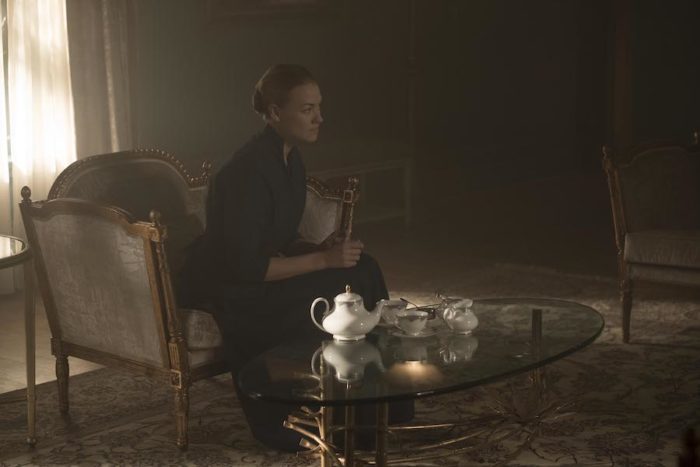UK TV review: The Handmaid’s Tale Season 2, Episode 5 (spoilers)
Review Overview
Male oppression
8Female support
8Sanctioned marriage
8David Farnor | On 20, Jun 2018
Warning: This contains spoilers for Episode 5 of The Handmaid’s Tale Season 2. Catch up with our weekly reviews of previous episodes here. Not seen Season 1? Click here to see where you can watch it online.
“What is the matter with you?” Serena (Yvonne Strahovski) asks Offred (Elisabeth Moss) in Episode 5 of The Handmaid’s Tale Season 2, and it’s a sign of just how much our Handmaid has changed in recent episodes that she not only notices but actually asks. After the brutal psychological battering June received at the hands of Aunt Lydia, it’s no surprise that she should retreat into the proverbial closet and Offred should emerge in her place – compliant, calm and eerily quiet.
Moss has done so much with her facial expressions over these two seasons of Hulu’s drama, captured pain in a grimace, shock in a breath, anger and retribution in a glare. Here, though, she’s blank, almost entirely absent, her face mainly gazed down towards the floor. When she notices that she is bleeding in her underwear, it’s no wonder that she says nothing – she’s vacant, going through the motions with a detachment that finds a new tragic low for even this programme. Underneath that obedient surface is the ongoing drive to survive: Offred knows that if her pregnancy should miscarry or go awry in some way, not only is her baby in danger, but also she is – her value, her worth, her very point of existence has been eroded down by Gilead to the sole function of bearing child. If she can’t do that, why would they bother to keep her? And how severe would their wrath be?
The fact that we want her to be thinking this, calculating her silence, waiting fearfully or fiercely for the right time to speak up and take action is a smart piece of writing – because it puts us in exactly the position that Serena finds herself in. The question of whether we can continue to watch June suffer endlessly, episode after episode, is a very real concern for this show’s sophomore run, which no longer has Margaret Atwood’s book to guide its narrative. But Episode 5 finds a compelling new answer by shifting the focus away from Offred and onto her mistress.
Strahovski’s performance is a grippingly sharp one of poise and portent, the kind of flinty presence that puts a whole room on edge. But Serena is a far more complicated character than she might be in another show’s hands, and The Handmaid’s Tale finds a fresh burst of ambiguity in the way it explores her subtle inner conflicts – and extends that out to examine the role that women play within Gilead in general, both for the society and for each other.
Serena, of course, was instrumental in the rise of this regime – it was, to put it one way, her baby from the off, and she not only brought it into the world, but enabled and supported the violence and discrimination it took to ensure its position of power. She’s a walking reminder that women can sometimes help to perpetuate sexist persecution, because humans, when the chips are down, do not always root for each other and instead focus on themselves – whether it’s for their safety, or just the ability to be one step above someone else.
And so when Offred becomes a silent servant, as she is meant to be, Serena finds herself missing the outspoken rebel in her household – with no enemy to quash, she has nobody to push back into their place. As they walk through the town, she criticises Offred for not making small talk – ostensibly, their chat is so the baby can get used to Serena’s voice, but it’s also a rare chance for social interaction. Serena resorts to the age-old method of gossip to try and get a conversation going – “She’s God’s chosen vessel,” she says cattily, of another Wife, “but I’m surprised he wants her to pass on that nose.” – but even that emphasises her knack for putting herself above others, whether by insult behind their back or bullying face to face.
There’s similar nuance in the power dynamics between the Aunts and Wives, who, until now, we’ve mostly presumed rank alongside each other. But, of course, there’s tension between those minutely separated ranks, and Ann Dowd relishes the chance to bring additional shades of grey to her monstrous maternal figure. While Wives hold down their Handmaids for their husbands to rape them, the Aunts are brainwashing everything they can to convince them all it’s the right thing to do – and then discipline those who disagree accordingly. They foster an atmosphere of suspicion and isolating distrust, ruling over this normalised dystopia with a pencil of bureaucracy. Literally, it turns out, as Aunt Lydia makes a point of noting the pencil she carries around to record Offred’s weight – Wives aren’t allowed to carry writing implements, and Handmaids certainly aren’t. Why entrust anyone other than the Aunts to document things that might not conform to the official version of the truth?
Aunt Lydia cheerfully reminds Serena that it’s important to have a positive mood in the household, only reinforcing the painful position Serena is in. Do we feel sympathy for her? Not really, and we definitely don’t approve of Aunt Lydia, who goes to any extent to put the Commander’s Wife in her place. The rungs and ladders just keep on stretching down – the trick is doing what you must to climb.
Even Fred, who wants to reward Nick for his service, decides he doesn’t want to give him a helping foot up – after all, why promote someone who is so good at being your employee? More specifically, why encourage someone when you’re also trying to make sure that those looks between them and your Handmaid don’t continue?
And so Gilead gathers for a ceremony that sees men congratulated for their contributions to society. The prize? Not a medal, or a promotion, but something much more valued in Gilead: a wife. It’s a horrible spectacle to witness, even more so due to its pomp and righteous ceremony, and we know before the veils on each Wife is lifted that these brides, treated as possessions to be awarded, are going to be sickeningly young.
It’s a disturbing glimpse of systemic oppression in action, but it’s also a devastating final blow for Offred, whose feelings for Nick were the only thing she had left inside her that was secret, and was wholly hers. Now, even that’s been taken. “Doesn’t he look handsome?” smiles Serena, who, of course, is sitting right there to milk the removal of Offred’s last ally for all its worth.
The rest of the episode consists of cutaways to the Colonies, where Janine and Emily are slaving away in the toxic wasteland. Janine is worryingly upbeat, assuring Emily that God is watching over them and even protecting them. Emily, on the other hand, is far too aware of the reality of their situation to be duped. “God couldn’t hold you in the palm of his hand somewhere else?” comes her cynical reply. “Like Bora Bora?” Is it that Janine has been brainwashed afresh, before being sent out into slavery? Or is she simply in denial and retreating into her own mind – not unlike Offred – because the only other option is unthinkable?
The Colonies proves to be the unexpected source of rare positivity this episode, as Janine arranges a wedding for two of the women. It’s a small affair, overseen by a rabbi, but one that marks a stirring act of defiance, not only because it ties together woman and woman in matrimony (remember same-sex marriages were declared illegal and invalid when Gilead rose to power), but also because it dares to allow them a moment of happiness, before one of them passes away. It’s a moment that’s surprisingly underplayed, or at least appears so in the face of such relentless, harrowing depression.
What a contrast that wedding is to Nick’s, as his new bride, Eden, moves into the Commander’s household, welcomed by both Fred and Serena. (“Just husbands and Wives, now,” Serena smugly tells Offred, dismissing her to her room.) But Nick, smoking in the rainy street later that night, discovers that Offred has left her chamber – and is lying in the bushes outside, unconscious. Did she fall? Did she jump? And if she did, was it an attempted at escape or suicide?
We presume it’s the latter, but what becomes clear when she’s in hospital later is that Offred has gone, and June is back. “I will not let you grow up in this place,” she whispers to her pregnant tummy, which has a heartbeat monitor attached to it, confirming her baby is still OK.
Can we watch her go through that cycle of defeat and defiance many more times? Probably not, but if The Handmaid’s Tale can continue to widen its focus to explore other people’s roles too, Season 2 still has beating life in it yet.
The Handmaid’s Tale: Season 1 to 3 is available to watch online on Amazon Prime Video as part of a Prime membership or a £5.99 monthly subscription. It is also available on All 4.
























